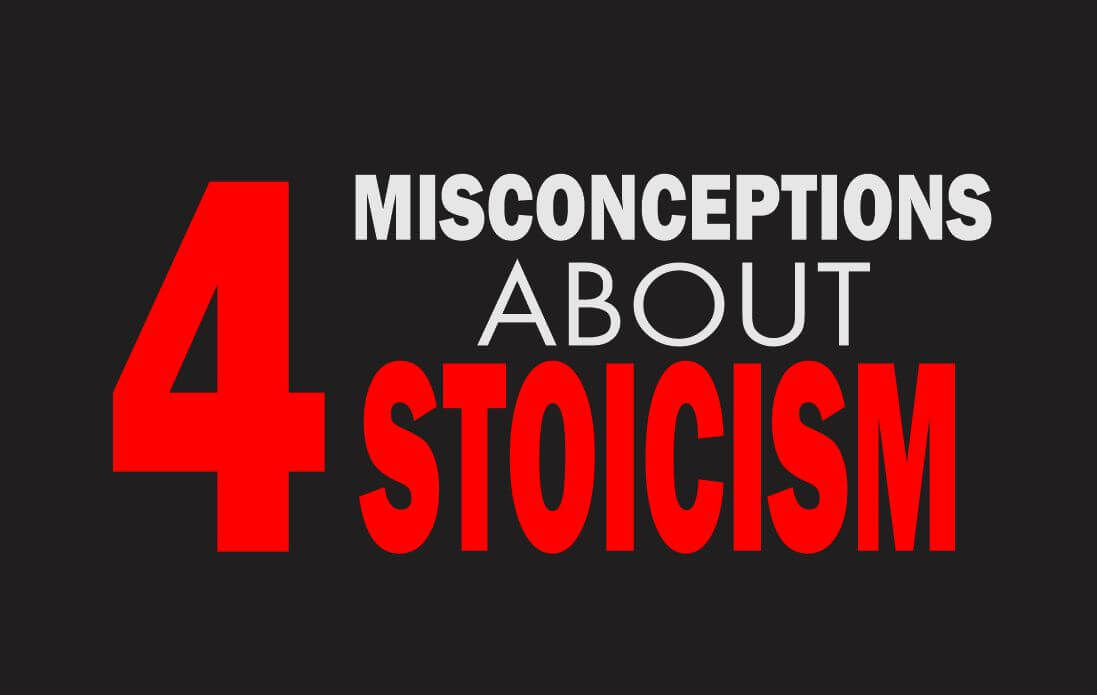Discover the truth about Stoicism. Debunking common myths and misconceptions about Stoicism, an ancient philosophy that leaves a lot of people skeptical.
Well, it’s time to set the record straight. In this thought-provoking piece, we will beam our light into Stoicism and debunk four prevailing misconceptions that have clouded its true essence.
Stoicism, often associated with the suppression of emotions and an unfeeling demeanour, is a philosophy that has gained significant popularity in recent years.
However, it has also been misunderstood and misinterpreted along the way.
So, let’s embark on a journey of discovery and unravel the truth behind Stoicism’s teachings.
From the belief that Stoics are emotionless robots to the perception of passivity and pessimism, we will dismantle these common misunderstandings, piece by piece.
By the end, you will have a clearer understanding of what Stoicism truly entails and why it continues to resonate with individuals seeking wisdom and inner tranquility.
An Overview of Stoicism
Stoicism is an ancient philosophy that originated in Greece around 300 BC.
It is a philosophy that emphasizes the importance of living a virtuous life, and it teaches that the key to happiness lies in living by nature and accepting what cannot be changed.
Stoicism is often associated with the idea of emotional detachment, but this is a common misconception.
Instead, Stoics believe in acknowledging and accepting emotions, but not allowing them to control your actions.
The philosophy has had a significant influence on Western thought and has been embraced by many as a way of life that promotes inner peace, resilience, and personal growth.
However, people misunderstand these teachings and interpret them the way they feel.
Read a comprehensive article on Stoicism here.
Importance of Addressing Misconceptions about Stoicism
Correcting the myths and misconceptions about Stoicism is vital as it encourages a more accurate comprehension of this ancient philosophy.
Misunderstandings can deter people from reaping its benefits. For instance, the false notion of Stoics as emotionless may dissuade potential adherents who fear emotional suppression.
Similarly, the belief that Stoicism is exclusively for the elite can deter diverse individuals.
Addressing these myths and misconceptions helps to get a deeper understanding of Stoicism, inviting personal growth, resilience, and inner peace exploration.
Related: Integrating Stoicism in Relationships for Satisfaction
The 4 Misconceptions About Stoicism
Myths and misconceptions about Stoicism are many, but we have distilled them into these four common misconceptions which are overarching.
- Stoicism teaches emotional suppression
- Stoics and unfeeling and cold
- Stoicism Advocates for Passivity and Acceptance of Everything
- Stoicism Is Only for A Certain Type of Person
Let’s check them out one by one:
Misconception 1: Stoicism Teaches Emotional Suppression
One of the most common misconceptions about Stoicism is that it teaches emotional suppression.
This is false, as you will be guided appropriately in the following explanation.
We are debunking this misconception about Stoicism and shedding light on the Stoic view on emotions.
Stoics’ View on Emotions
Contrary to popular belief, Stoicism does not teach emotional suppression. Instead, Stoics believe in acknowledging and accepting emotions, but not allowing them to control one’s actions.
According to Stoic philosophy, emotions are natural and inevitable, but they can also be irrational and harmful if not properly managed.
Therefore, Stoics aim to cultivate emotional intelligence and self-control, rather than suppressing emotions altogether.
Related: The Four Virtues Of Stoicism: Your Path To Inner Peace
Stoics believe that emotions are the result of our judgments about external events, rather than the events themselves.
For example, if someone insults us, we may feel angry or hurt.
However, according to Stoic philosophy, it is not the insult itself that causes our emotions, but rather our judgment that the insult is a bad thing.
Therefore, by changing our judgments, we can change our emotional responses to external events.
Related: Importance of Stoicism in Mental Health
Importance of Acknowledging and Accepting Emotions
Acknowledging and accepting emotions is an important aspect of Stoic philosophy.
By acknowledging our emotions, we can better understand ourselves and our reactions to external events.
Being self-aware can assist us in recognizing the aspects of ourselves that require personal growth and development.
Additionally, by accepting our emotions, we can avoid the harmful effects of emotional suppression, such as anxiety, depression, and physical illness.
Stoics believe that emotions are neither good nor bad in themselves, but rather our judgments about them determine their value.
Therefore, by accepting our emotions and reframing our judgments, we can transform negative emotions into positive ones.
For example, instead of feeling angry at an insult, we can choose to feel compassion for the person who insulted us, recognizing that they are likely suffering in some way.
Takeaway
Stoicism does not teach emotional suppression, but rather emotional intelligence and self-control.
By acknowledging and accepting our emotions, we can better understand ourselves and our reactions to external events and avoid the harmful effects of emotional suppression.
Stoicism offers a powerful framework for personal growth and development, and by embracing its principles, we can cultivate inner peace, resilience, and a positive outlook on life.
Related: Cultivating The 12 Core Principles of Stoicism
Misconception 2: Stoics are Unfeeling and Cold

Another common myth and misconception about Stoicism is that Stoics are unfeeling and cold. This is not true.
As you will see in this explanation, Stoics are the opposite of that misconception.
We will debunk this misconception and shed light on how Stoics cultivate empathy and compassion.
Explanation of How Stoics Cultivate Empathy and Compassion
Contrary to popular belief, Stoics do not lack empathy or compassion.
Stoics believe that empathy and compassion are essential for living a virtuous life.
According to Stoic philosophy, empathy and compassion are natural human emotions that arise from our shared humanity.
Therefore, Stoics aim to cultivate these emotions, rather than suppress them.
Stoics believe that empathy and compassion are the results of our ability to reason and understand the perspectives of others.
By using reason and empathy, we can better understand the needs and desires of others, and act in ways that promote their well-being.
Additionally, by cultivating empathy and compassion, we can develop stronger relationships with others and promote a sense of community.
Examples of Stoic Figures Who Were Compassionate and Empathetic
There are many examples of Stoic figures who were compassionate and empathetic.
For example, the Roman emperor Marcus Aurelius, who is often considered one of the greatest Stoic philosophers, was known for his compassion and concern for the well-being of his subjects.
In his Meditations, he wrote about the importance of treating others with kindness and respect, and of recognizing our shared humanity.
Related: Stoic Approach to Relationship Conflicts

Related: Finding Purpose And Meaning: Why The World Needs More Stoic Men
Another example is the Stoic philosopher Epictetus, who emphasized the importance of empathy and compassion in his teachings.
He believed that we should treat others as we would like to be treated and that we should strive to understand the perspectives of others, even if we do not agree with them.
Stoics believe in cultivating empathy and compassion and recognize the importance of these emotions for living a virtuous life.
Takeaway
Stoics are empathetic and compassionate. It is evident in their teachings and their practice.
By understanding and embracing the Stoic view on empathy and compassion, we can develop stronger relationships with others, promote a sense of community, and live a more fulfilling life.
Related: Cultivating Stoic Principles in Your Relationships
Misconception 3: Stoicism Advocates for Passivity and Acceptance of Everything

The third common myth and misconception about Stoicism is that Stoicism advocates for passivity and acceptance of everything.
We will debunk this misconception and shed light on the Stoic view on action and virtue.
The View of Stoicism on Action and Virtue
Contrary to popular belief, Stoicism does not advocate for passivity and acceptance of everything.
Instead, the Stoics believe in taking action to promote virtue and the common good.
According to Stoic philosophy, the key to a virtuous life is to act by reason and to cultivate the virtues of wisdom, courage, justice, and self-control.
Stoics believe that we should focus on what is within our control, rather than worrying about things that are outside of our control.
Therefore, while we cannot control external events, we can control our reactions to them.
By focusing on our actions and cultivating virtue, we can make a positive impact on the world around us.
Examples of Stoics Who Were Politically Active and Advocated for Change
There are many examples of Stoics who were politically active and advocated for change.
For example, the Roman statesman and philosopher Seneca was a vocal advocate for political reform and social justice.
He believed that it was the duty of the wealthy and powerful to use their resources to help those in need, and he worked to promote policies that would benefit the common good.
Another example is the Stoic philosopher Epictetus, who taught that we should use our reason and virtue to promote justice and equality.
He believed that we should speak out against injustice and work to create a more just society.
In modern times, the Stoic philosopher and writer Massimo Pigliucci has advocated for the application of Stoic principles to contemporary issues, such as climate change and social justice.
He believes that Stoicism can provide a framework for taking action to promote the common good and address pressing social and environmental issues.
Takeaway
The misconception that Stoicism advocates for passivity and acceptance of everything is simply not true.
Stoics believe in taking action to promote virtue and the common good, and many Stoics throughout history have been politically active and advocated for change.
By understanding and embracing the Stoic view on action and virtue, we can make a positive impact on the world around us and live a more fulfilling life.
Related: The Effects of Stoicism on Men
Misconception 4: Stoicism Is Only for A Certain Type of Person

The last of the misconceptions about Stoicism is that Stoicism is only for a certain type of person.
We are also debunking this misconception and shed light on how Stoic philosophy applies to anyone.
Explanation Of Stoic Philosophy Applicable to Anyone
Contrary to popular belief, Stoic philosophy applies to anyone, regardless of their background or circumstances.
Stoicism is not a religion or a set of beliefs, but rather a practical philosophy that can be applied to everyday life.
According to Stoic philosophy, the key to a virtuous life is to cultivate the virtues of wisdom, courage, justice, and self-control, and to act by reason.
Stoicism emphasizes the importance of focusing on what is within our control, rather than worrying about things that are outside of our control.
Therefore, anyone can benefit from Stoic philosophy by learning to cultivate their virtues and focusing on their actions, rather than being consumed by external events.
Examples of Modern-Day Stoics from Diverse Backgrounds
There are many examples of modern-day Stoics from diverse backgrounds.
- Tim Ferriss: For example, the writer and entrepreneur Tim Ferriss has spoken about his use of Stoic philosophy to overcome anxiety and achieve success in his career. Ferriss has emphasized the practicality of Stoic philosophy and its applicability to anyone, regardless of their background or circumstances.
- Donald Glover: Another example is the musician and actor Donald Glover, who has spoken about his use of Stoic philosophy to cope with the pressures of fame and success. Glover has emphasized the importance of focusing on what is within our control and cultivating our virtues, rather than being consumed by external events.
Takeaway
The misconception that Stoicism is only for a certain type of person is simply not true.
Stoic philosophy applies to anyone, regardless of their background or circumstances.
By learning to cultivate our virtues and focusing on what is within our control, we can live a more fulfilling life and achieve greater success and happiness.
Frequently Asked Questions
What is Stoicism?
Stoicism is an ancient philosophy focused on cultivating emotional resilience and living in harmony with reason, emphasizing virtue, self-control, and resilience in adversity.
Is Stoicism about suppressing emotions?
No, Stoicism teaches healthy emotional responses to situations by acknowledging emotions while choosing rational, virtuous actions for a balanced perspective.
Can Stoicism make you indifferent?
Stoicism teaches that acknowledging our emotions but not letting them control us can lead to a more fulfilled and meaningful life.
Does Stoicism ignore pain and suffering?
Stoicism advocates acknowledging pain and suffering as part of the human experience while encouraging a rational and virtuous response for growth.
Conclusion
It is important to address the common myths and misconceptions about Stoicism to fully understand and appreciate this ancient philosophy.
Stoicism is often misunderstood as a philosophy that promotes unfeeling passivity, and acceptance of everything and is only applicable to a certain type of person.
However, as we have seen, these misconceptions are simply not true. Stoicism is a practical philosophy that emphasizes the cultivation of virtues, the importance of reason, and the focus on what is within our control.
It is encouraging to see that Stoicism is gaining popularity in modern times as a way of life that promotes inner peace, resilience, and personal growth.
References:
- Debunking Some Myths About Stoicism
- LotusBuddhas: 5 Common Myths about Stoicism
- Kai Whiting: Clearing up Misconceptions about Stoicism
- Modern Stoicism: What Many People Misunderstand about the Stoic
Pyo Merez (PsyD) is a distinguished adolescent and adult psychologist at the forefront of mental health advocacy.
With expertise in cognitive and developmental psychology, focusing on social relationships, cultural contexts, and individual differences, Pyo has dedicated his career to empowering adolescents and adults.
As a sought-after speaker and panelist, Pyo shares invaluable insights on issues affecting young people, contributing to a deeper understanding of mental health and well-being in today's society.

